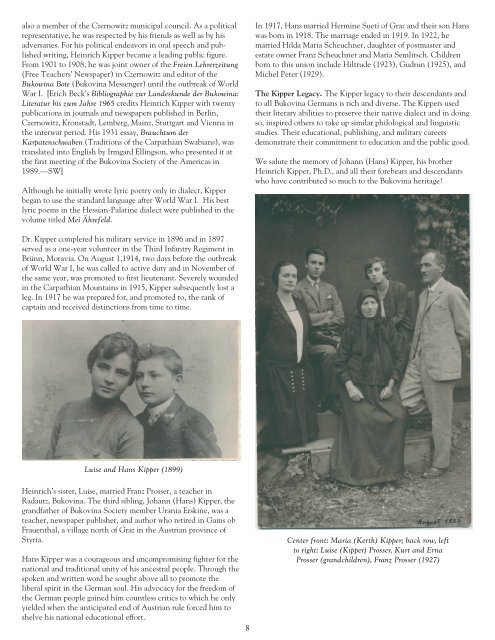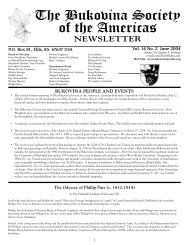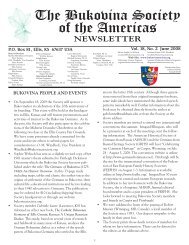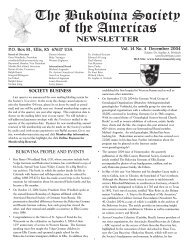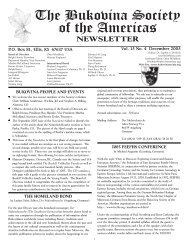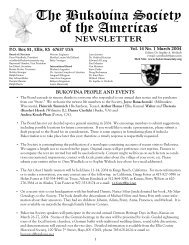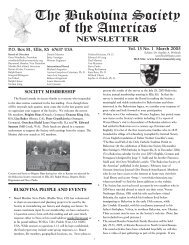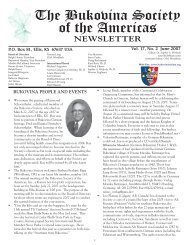newsletter - Bukovina Society of the Americas
newsletter - Bukovina Society of the Americas
newsletter - Bukovina Society of the Americas
Create successful ePaper yourself
Turn your PDF publications into a flip-book with our unique Google optimized e-Paper software.
also a member <strong>of</strong> <strong>the</strong> Czernowitz municipal council. As a political<br />
representative, he was respected by his friends as well as by his<br />
adversaries. For his political endeavors in oral speech and published<br />
writing, Heinrich Kipper became a leading public figure.<br />
From 1901 to 1908, he was joint owner <strong>of</strong> <strong>the</strong> Freien Lehrerzeitung<br />
(Free Teachers’ Newspaper) in Czernowitz and editor <strong>of</strong> <strong>the</strong><br />
Bukowina Bote (<strong>Bukovina</strong> Messenger) until <strong>the</strong> outbreak <strong>of</strong> World<br />
War I. [Erich Beck’s Bibliographie zur Landeskunde der Bukowina:<br />
Literatur bis zum Jahre 1965 credits Heinrich Kipper with twenty<br />
publications in journals and newspapers published in Berlin,<br />
Czernowitz, Kronstadt, Lemberg, Mainz, Stuttgart and Vienna in<br />
<strong>the</strong> interwar period. His 1931 essay, Brauchtum der<br />
Karpatenschwaben (Traditions <strong>of</strong> <strong>the</strong> Carpathian Swabians), was<br />
translated into English by Irmgard Ellingson, who presented it at<br />
<strong>the</strong> first meeting <strong>of</strong> <strong>the</strong> <strong>Bukovina</strong> <strong>Society</strong> <strong>of</strong> <strong>the</strong> <strong>Americas</strong> in<br />
1989.—SW]<br />
Although he initially wrote lyric poetry only in dialect, Kipper<br />
began to use <strong>the</strong> standard language after World War I. His best<br />
lyric poems in <strong>the</strong> Hessian-Palatine dialect were published in <strong>the</strong><br />
volume titled Mei Ährefeld.<br />
Dr. Kipper completed his military service in 1896 and in 1897<br />
served as a one-year volunteer in <strong>the</strong> Third Infantry Regiment in<br />
Brünn, Moravia. On August 1,1914, two days before <strong>the</strong> outbreak<br />
<strong>of</strong> World War I, he was called to active duty and in November <strong>of</strong><br />
<strong>the</strong> same year, was promoted to first lieutenant. Severely wounded<br />
in <strong>the</strong> Carpathian Mountains in 1915, Kipper subsequently lost a<br />
leg. In 1917 he was prepared for, and promoted to, <strong>the</strong> rank <strong>of</strong><br />
captain and received distinctions from time to time.<br />
Luise and Hans Kipper (1899)<br />
Heinrich’s sister, Luise, married Franz Prosser, a teacher in<br />
Radautz, <strong>Bukovina</strong>. The third sibling, Johann (Hans) Kipper, <strong>the</strong><br />
grandfa<strong>the</strong>r <strong>of</strong> <strong>Bukovina</strong> <strong>Society</strong> member Urania Erskine, was a<br />
teacher, newspaper publisher, and author who retired in Gams ob<br />
Frauenthal, a village north <strong>of</strong> Graz in <strong>the</strong> Austrian province <strong>of</strong><br />
Styria.<br />
Hans Kipper was a courageous and uncompromising fighter for <strong>the</strong><br />
national and traditional unity <strong>of</strong> his ancestral people. Through <strong>the</strong><br />
spoken and written word he sought above all to promote <strong>the</strong><br />
liberal spirit in <strong>the</strong> German soul. His advocacy for <strong>the</strong> freedom <strong>of</strong><br />
<strong>the</strong> German people gained him countless critics to which he only<br />
yielded when <strong>the</strong> anticipated end <strong>of</strong> Austrian rule forced him to<br />
shelve his national educational effort.<br />
8<br />
In 1917, Hans married Hermine Sueti <strong>of</strong> Graz and <strong>the</strong>ir son Hans<br />
was born in 1918. The marriage ended in 1919. In 1922, he<br />
married Hilda Maria Scheuchner, daughter <strong>of</strong> postmaster and<br />
estate owner Franz Scheuchner and Maria Semlitsch. Children<br />
born to this union include Hiltrude (1923), Gudrun (1925), and<br />
Michel Peter (1929).<br />
The Kipper Legacy. The Kipper legacy to <strong>the</strong>ir descendants and<br />
to all <strong>Bukovina</strong> Germans is rich and diverse. The Kippers used<br />
<strong>the</strong>ir literary abilities to preserve <strong>the</strong>ir native dialect and in doing<br />
so, inspired o<strong>the</strong>rs to take up similar philological and linguistic<br />
studies. Their educational, publishing, and military careers<br />
demonstrate <strong>the</strong>ir commitment to education and <strong>the</strong> public good.<br />
We salute <strong>the</strong> memory <strong>of</strong> Johann (Hans) Kipper, his bro<strong>the</strong>r<br />
Heinrich Kipper, Ph.D., and all <strong>the</strong>ir forebears and descendants<br />
who have contributed so much to <strong>the</strong> <strong>Bukovina</strong> heritage!<br />
Center front: Maria (Kerth) Kipper; back row, left<br />
to right: Luise (Kipper) Prosser, Kurt and Erna<br />
Prosser (grandchildren), Franz Prosser (1927)


